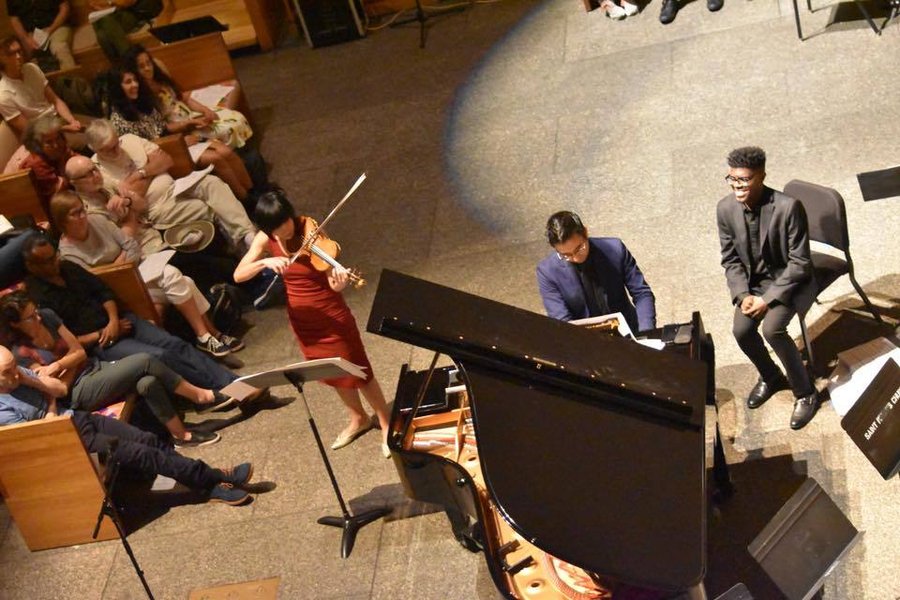National Sawdust Log
By Vivien Schweitzer
August 2, 2018
original link
In Review: The Dream Unfinished + Contemporaneous
“Build the wall” has become one of the most noxious slogans of the Trump era, but the rampart the composer Huang Ruo alludes to in The Sonic Great Wall (2016) symbolizes an ancient structure that both deterred foreigners and facilitated communication. The work proved an apt centerpiece for “Sanctuary,” a program of contemporary music at St. Peter’s Church in Manhattan that highlighted the plight of immigrants under the Trump administration, and the contributions of immigrant composers such as the Chinese-born Ruo. The Sonic Great Wall is an exercise in collaborative music making, one that in this context seemed to echo the rallying cry to participation and activism heard from a lineup of impassioned speakers.
The clarinetist Eun Lee introduced the program, which was hosted by Terrance McKnight and co-presented by Contemporaneous and The Dream Unfinished—the latter an activist ensemble, deftly conducted throughout the evening by David Bloom. The mission of The Dream Unfinished – which has focused recently on police brutality and the #SayHerName movement – is using classical music to spark dialogue about racial and social injustices, and hopefully to inspire audiences to take action.
Art itself can’t save the world. But, as The Dream Unfinished founder and executive director Lee pointed out, it “can expose us to hidden complexities.” She urged the audience to reconsider the definition of an immigrant, and highlighted little known statistics, such as recent data showing that one out of every seven Asian immigrants is undocumented.
During an abridged account of Ruo’s work – for me, the concert’s highlight – audience members held up pieces of paper, upon which they had written words that came to mind when they thought about sanctuary and walls. Members of The Dream Unfinished walked in the aisles and improvised on those audience contributions, the wandering musicians creating a richly-textured and evocative sound world inspired in part by words such as peace, warm, hope, exclusion, safety, utopia, and exhaustion.
Composers and performers from immigrant backgrounds have always been a vital part of the American musical scene. Irving Berlin, a Russian-Jewish immigrant, wrote “God Bless America” when he received American citizenship in in 1918: it was an ode to the country to which his family fled when they were persecuted in their native land.
The elder statesman on Friday’s program was the 96-year-old African-American composer George Walker, the son of a Jamaican immigrant. Walker used a text by the 19th-century English writer Leigh Hunt for Abu, scored for narrators and chamber ensemble. The work’s glittering sonorities and mystical qualities evoke the dream-setting of Hunt’s poem “Abou Ben Adhem,” about a pious man who gives up his riches and dedicates himself to serving his community.
The Syrian-American composer Kareem Roustom’s Dabke for string orchestra was based on the celebratory Arab folk dance of the same name performed at weddings in the Levant. The word “dabke” refers to the stomping feet heard in the rhythmically boisterous line dance, whose rhythms are conveyed in this evocative piece by the strings. The Cuban-American composer Tania León wrote Indígena (1991) after a visit to Cuba: woodwinds evoke the different accents and personalities of the people she met on her journey, and raucous trumpet and percussion depict a Carnival festival of masked revelers.

Phoyo by David Caines Burnett
Guest speakers interspersed throughout the program included Carlene Pinto of the New York Immigration Coalition and Fahd Ahmed, executive director of DRUM. The immigrant activist Ravi Ragbir, who is facing deportation, spoke about the racial injustice and economic inequalities inherent in the deportation system. Ninaj Raoul, co-founder of Haitian Women for Haitian Refugees, gave an eye-opening talk about the economic dangers of crop dumping, which has resulted in Haitian farmers losing their livelihoods, forcing some to emigrate in search of work.
The penultimate work on the lineup was by the pianist-composer Vijay Iyer. The violinist Jennifer Koh, whose mother was a refugee who fled North Korea, joined Iyer for The Diamond (2018), inspired by a Buddhist text known as “The Diamond that Cuts Through Illusion.” Divided into four sections, the piece opened with violin whispers that floated over misty piano chords then soared over roiling piano motifs. The music, at times elusive, transparent, and raucous, unfolded in a densely textured dialogue between the two instruments.
Iyer’s rhythmically complex Dig the Say (2012), which concluded the event, was inspired in part by lyrics from a James Brown song: “I don’t want nobody to give me nothing / Just open up the door / I’ll get it myself.” “Just open up the door” could have been an apt slogan for an event that was both a celebration of immigrants and a protest against so many doors being slammed shut.
Vivien Schweitzer is a music journalist, pianist, and author. Her new book A Mad Love: An Introduction to Opera will be published on September 18. She is a volunteer ESL and civics teacher at the Center for the Integration and Advancement of New Americans in Astoria.
Classical music coverage on National Sawdust Log is supported in part by a grant from the Rubin Institute for Music Criticism, the San Francisco Conservatory of Music, and the Ann and Gordon Getty Foundation. The Log makes all editorial decisions.
Copyright © National Sawdust Log
© Jennifer Koh, All Rights Reserved. Photography by Juergen Frank. Site by ycArt design studio